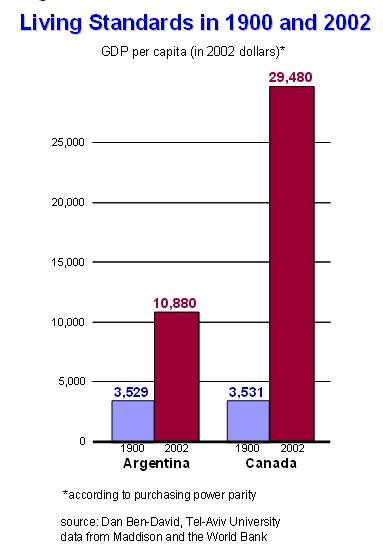|
PDF file
published
in Haaretz on April 10, 2006.
The Impact of Policy by Dan Ben-David For Israel to remain a democratic
country with a solid Jewish majority, determination of our borders is a
necessary – though definitely an insufficient – condition. Israel must also be the Jewish people’s
country of choice, and in particular, the country that our children and
grandchildren will want to live in. A nation’s economic and social state
of affairs is a direct outcome of its national priorities and of the relative
efficiency of its basic institutions such as education, police and courts. Economic forces affect not only those who
understand their strength and know how to channel them effectively. They can also exact a heavy subsequent price
from those who proceed along the path of deliberate or indeliberate ignorance. A free people in a democratic country are the
only ones responsible for determining their own destiny – and for the
information of those who believe that it is impossible for an already bad
situation to deteriorate even further, history provides us with a plethora of
evidence that indicates otherwise. For example, living standards (as
measured by output per capita) in Finland and Mexico were identical in 1820. Nearly two centuries later, Finland’s
standard of living is nearly three times that of Mexico. In 1870, standards of living were equal in
Japan, a country with meager natural resources, and in Brazil, a resource-abundant
nation. Today, Japan’s income per capita
is 3.5 times that of Brazil’s. Even the discovery of oil does not
provide insurance against populist policies.
Per capita incomes in Peru and Venezuela were nearly identical in 1900 –
approximately $1,050 (measured in today’s dollars) in each country. Since then, Peru’s living standards rose to $5,010
in 2002, compared to a similar $5,380 in Venezuela, a country blessed with vast
oil fields. By contrast, Korea, a resource-deficient
country that began with the same level of income per capita in 1900 as Peru and
Venezuela, that was later conquered and looted by the Japanese, that was
divided by a brutal civil war, managed nonetheless to get its act together and
grow in recent decades to reach an annual income of $16,950 per person by 2002. Two countries that in 1900 exhibited
abundant physical similarities, as well as a striking closeness in living
standards (as indicated in the graph) were Canada and Argentina. However, significant discrepancies in
policies implemented over the subsequent century, together with accompanying
institutional differences, led the average Canadian to become roughly three
times wealthier than the average Argentinean in 2002. Sometimes, the amount of damage that
humans can inflict on their countries through demagogic and populist policies
defies the imagination. In fact, income
gaps between nations are even larger than the huge income gaps within Israel. Disparity inside the very unequal Israel
during 2004/5 was reflected by a Gini coefficient equaling 0.52 while disparity
among 157 countries in 2002 reached a Gini coefficient of 0.53. Various research findings by myself
and by others indicate that income disparity between nations is not only very
high – it continues to rise all the time.
This is not simply a case of the wealthy countries breaking away from
the poor but rather an increase in disparity within nearly all randomly chosen
groups of countries. A comparison between Israel and the
leading western nations, collectively known as the G7, shows that in the years 1973-2004,
living standards in the G7 rose by 83% while Israeli standards of living rose
by just 53%. In other words, we are
steadily falling farther and farther behind in relative terms for over three
straight decades in comparison with countries that we had been closing the gap
with until 1973 (the year 2005 notwithstanding since last year’s high growth
rate primarily reflects our exit from a very severe recession). This is not a recipe for ensuring that Israel
remains the Jewish people’s country of choice. It is crucial that the Israeli public
and its newly elected leadership internalize this global reality. Differences in standards of living do not
reflect divine destiny but rather the level of policies implemented in each
country. It is all in our hands. comments
to:
danib@post.tau.ac.il
|
